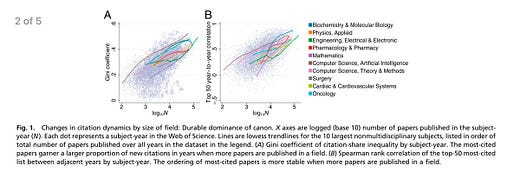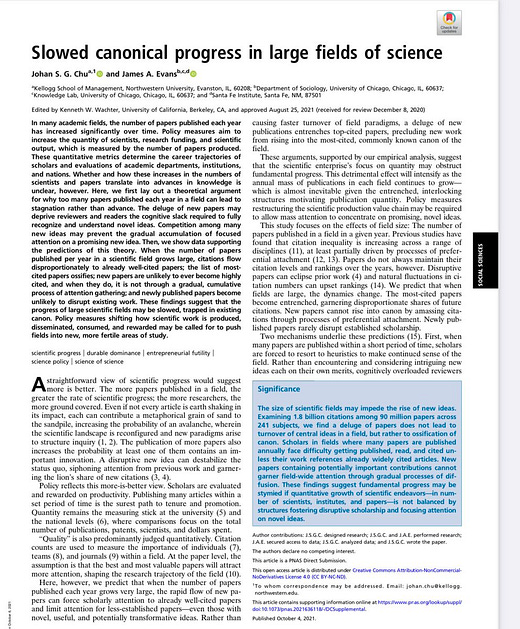Best of #econtwitter - Week of October 10, 2021
Oct 10, 2021
Welcome readers old and new to this week’s edition of Best of Econtwitter. Thanks to those sharing suggestions, over email or on Twitter @just_economics.
Paper summary threads

Dashun Wang@dashunwang
There have been so many interesting papers published in the #ScienceOfScience just within the past days, that it warrants a thread to tweet about them! Here it is. A trio of papers on the growth of fields 1/
1:43 PM · Oct 7, 2021
19 Reposts · 52 Likes

Ethan Mollick@emollick
The paradox of our Golden Age of science: more research is being published by more scientists than ever, but the result is actually slowing progress! With too much to read & absorb, papers in more crowded fields are citing new work less, and canonizing highly-cited articles more.


1:19 AM · Oct 7, 2021
1.19K Reposts · 3.56K Likes

Igor Letina@IgorLetina
1/ I want to tell you about a super interesting paper I saw presented yesterday: *Talent Hoarding in Organizations* by @HaegeleIngrid
A short 🧵
10:04 PM · Oct 9, 2021
35 Reposts · 131 Likes

Aurelie Ouss@AurelieOuss
Judges in North Carolina rotate across courtrooms, and don't just work where they're elected. Their sentencing practices in a new place are initially different from what local judges do. But over time, they converge towards local sentencing norms.
2/4

1:59 PM · Oct 7, 2021
6 Reposts · 32 Likes

Pascal Michaillat@pmichaillat
Our work builds a model of promotion chains inspired by the behavior of beetles in flour jars at @UChicago in the 1950s and 1960s. When populations of two different species of beetle are placed into jars, one species quickly vanish -- & not necessarily the less biologically fit.


11:45 PM · Oct 4, 2021
1 Like
^thread; and yes you’re reading the right newsletter

Martin Beraja@MartinBeraja
🚨New paper🚨 with @ChristianKWolf
Consider two recessions. In one, people stop buying cars and furniture. In the other, they stop going to restaurants and the dentist. Would you expect the economic recoveries to differ?
A thread 🧵... 1/n
@MITEcon #EconTwitter

NBER @nberpubs
Recoveries from recessions concentrated in services and non-durables will tend to be weaker than from recessions biased towards durables, as the recovery is hampered by weaker pent up demand, from @MartinBeraja and @ChristianKWolf https://t.co/7YLRuCjTZc https://t.co/zhGhSHrg8L
11:45 AM · Oct 4, 2021
69 Reposts · 229 Likes

Florin Bilbiie@FlorinBilbiie
New Paper! (version …)
HALT: Heterogeneous-Agent Liquidity Traps
Looks at liquidity traps analytically, using the tractable (T)HANK model I developed in separate work; nests other analytical HANKs too.
What does HA do to LT?
1/n
drive.google.com/file/d/1vuE_Sn…

3:59 PM · Oct 8, 2021
13 Reposts · 45 Likes

Laura Hospido@laura_hospido
3/6 Focusing on males, we document that income risk is highly unequal in Spain: more than half of the economy has close to perfect predictability of their income, while some face considerable uncertainty. Also, income risk inequality increases markedly in recessions.

10:15 AM · Oct 6, 2021
7 Likes

Barbara Biasi@BarbaraBiasi
So happy that my paper “School Finance Equalization Increases Intergenerational Mobility” just got accepted at the Journal of Labor Economics! It's my 2nd-yr paper and 1st paper I ever worked during PhD. Its road was long and w/many obstacles, but in it I have learnt so much.1/8
6:43 PM · Oct 4, 2021
64 Reposts · 772 Likes

Francis Wong@francisawong
A: No.
We uncover a large racial/ethnic gap in housing returns that is driven entirely by foreclosures and short sales.
Mechanism: minorities have less stable jobs ➡️minorities more likely to become financially distressed ➡️foreclosures destroy minority housing wealth.

1:59 PM · Oct 4, 2021
1 Repost · 4 Likes

Kevin Griffith@AssumeNormality
🚨 PUBLIC GOOD ALERT 🚨
Measuring wait times for U.S. medical care is hard
Data are private, limited to "secret shopper" surveys, or particular specialties
UNTIL NOW. We've released 38M appt wait times for public use
Link: sciencedirect.com/science/articl…
A 🧵on these data (1/n)
sciencedirect.com
Appointment wait time data for primary & specialty care in veterans health administration facilities vs. community medical centers

1:59 PM · Sep 20, 2021
70 Reposts · 296 Likes

Evan Munro@_evan_munro
Excited to share a new working paper with S. Wager and @xu_kuang on estimating treatment effects in a market equilibrium! The paper applies a mix of game theory, asymptotic theory, and experiment design to tackle a problem in causal inference.
arxiv.org/pdf/2109.11647…
(1/3).
arxiv.org
3:56 PM · Oct 6, 2021
3 Reposts · 15 Likes
More: pretrial system; Portugal child health; smart thermostats; union membership; causal effect of loans
Interesting discussions

Peter Ganong@p_ganong
Short advice thread for budding economists applying now for predocs
TLDR: Being a predoc is/should be a major human capital investment that you and your PI will make together.
Look for someone who will invest in you rather than simply someone who is a big name. cc @econ_ra
10:30 AM · Oct 4, 2021
25 Reposts · 120 Likes

Rachael Meager@economeager
If you're on the tenure track or planning to be or hoping to be or even just thinking about being an academic or WHATEVER and you haven't read this, read it now
blogs.scientificamerican.com
The Awesomest 7-Year Postdoc or: How I Learned to Stop Worrying and Love the Tenure-Track Faculty Life

1:22 PM · Oct 5, 2021
105 Reposts · 485 Likes
^“oldie but a goodie” but more importantly interesting discussions in the replies, eg

Calvo Fairy@FairyCalvo
@GonHuertas @sarahmrose @SorryToBeKurt Fwiw - a few times I have seen someone on Twitter (not this case in particular) complaining about “aggressive” referees on a paper I refereed. In every such case where I have personal knowledge, the authors have been wrong - blaming a serious problem with their paper on referees.
9:26 PM · Oct 7, 2021
2 Likes

Lukasz Rachel@LukaszRachel
Absolutely delighted to share the junior prize in macro from the University of Copenhagen and Danish National Bank with the fantastic @janeor_econ @RustamJamilov @LiraMota1 today. A short thread on the important contributions of my co-recipients 🧵🏅 1/12
6:33 PM · Oct 8, 2021
4 Reposts · 73 Likes

Lyman Stone 石來民 🦬🦬🦬@lymanstoneky
so basically census is discontinuing sub-county data
cool cool cool

Upzone New Jersey 🏗️ @upzonenj
.@IPUMS sent this out and it's honestly insane what the @uscensusbureau is doing. Researchers/policy professionals/etc..., please respond to this. https://t.co/3cKKrZHQ9O https://t.co/j5M3o5fnbD
12:57 AM · Oct 8, 2021
3 Reposts · 23 Likes

